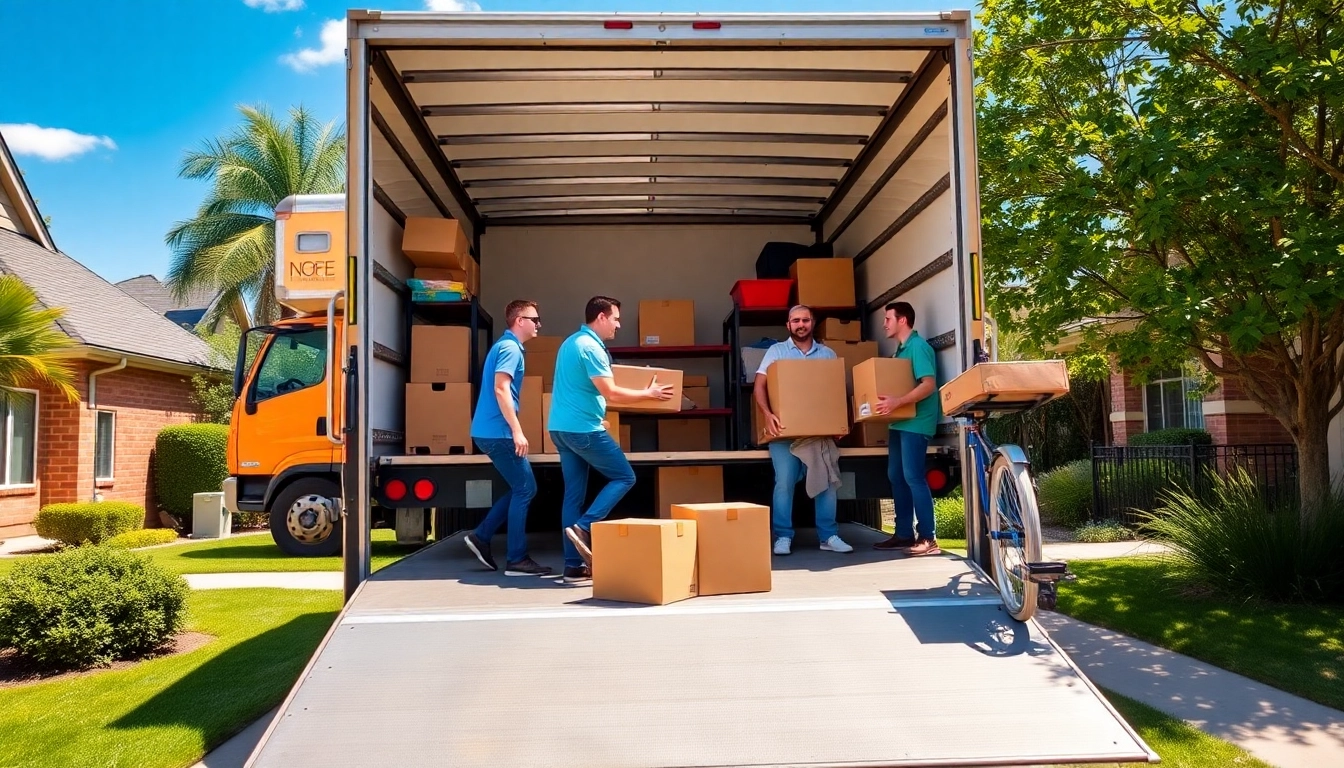Understanding the Basics of House Moves
House moves can be one of the most significant transitions in a person’s life, whether you’re relocating for a new job, seeking a larger home for your growing family, or downsizing for retirement. The process involves much more than just packing up your belongings; it requires strategic planning, effective communication, and a thorough understanding of various logistical challenges. By grasping the fundamentals of house moves, you can prepare more effectively for what lies ahead and ensure a seamless transition to your new residence.
What are House Moves?
House moves refer to the process of relocating from one home to another. This involves numerous tasks, including organizing, packing, and physically transferring belongings to a new location. A successful house move hinges on careful planning and execution, enabling not only smooth transportation of items but also minimizing stress for all parties involved. While some individuals opt to handle their relocation independently, hiring professional movers can significantly ease the burden.
Common Challenges During House Moves
Relocating can be fraught with challenges that may significantly impact the moving experience. Understanding these common issues can help you prepare better:
- Time Management: Juggling work commitments, family responsibilities, and the physical demands of moving can lead to delays and oversight.
- Logistical Issues: Securing a moving truck, determining the best route, and timing the move to avoid traffic are crucial logistical elements that can pose challenges.
- Emotional Stress: Moving is often associated with emotional upheaval, particularly when leaving behind a cherished home or community.
- Condition of Belongings: Ensuring that all items arrive in their original condition requires diligent packing and handling.
Planning Your House Move Timeline
Creating a timeline for your house move can dramatically reduce stress and ensure that critical tasks are completed on time. Here’s a step-by-step approach:
- Two Months Before the Move: Begin decluttering your home to determine what items you’ll take to your new place.
- One Month Before the Move: Confirm any hired moving services and finalize your moving date.
- Two Weeks Before the Move: Start packing non-essential items, and inform essential parties (utilities, services) of your new address.
- One Week Before the Move: Pack essential items for the move and create a moving-day kit with necessities.
- Moving Day: Conduct a final walkthrough of your old home, ensuring nothing is left behind.
Preparing for Your House Move
Decluttering Before Your House Move
Decluttering is an essential step in preparing for a house move, allowing you to reduce the volume of items you need to pack and transport. Here’s how to effectively declutter:
- Evaluate Each Item: Ask yourself if each item is something you need or value. If not, consider donating or selling it.
- Plan a Garage Sale: Organizing a sale can help you declutter while generating a little extra cash for your move.
- Utilize Donation Centers: Many organizations accept donations of clothes, furniture, and household items.
- Start Early: Begin the decluttering process well before your moving date to alleviate pressure as moving day approaches.
Packing Essentials for House Moves
Effective packing is crucial for a successful move. Here are essential tips to ensure your items are packed efficiently:
- Quality Packing Materials: Invest in sturdy boxes, bubble wrap, tape, and markers for labeling.
- Organized Packing: Pack items by category (e.g., kitchen, bedroom) and label each box accordingly.
- Protect Fragile Items: Wrap glass and fragile objects in bubble wrap or blankets to prevent damage during transit.
- Room-by-Room Packing: Focus on packing one room at a time to remain organized and reduce confusion.
- Essential Box: Create a box for immediate necessities, including toiletries, clothes, and important documents.
Choosing the Right Moving Services
Selecting a moving service can significantly impact your house move’s success. Here are criteria to consider:
- Reputation: Research moving companies by reading reviews and asking for recommendations from friends and family.
- Services Offered: Determine if you need full-service movers, truck rentals, or labor-only assistance.
- Cost Estimates: Obtain multiple quotes from different companies and ensure clarity about any extra charges.
- Insurance Options: Confirm if the moving company provides insurance options to protect your belongings during transit.
Executing a Successful House Move
Creating a House Move Checklist
A well-structured move checklist will help keep you organized throughout the moving process. Here is a comprehensive example:
- Before the Move: Research moving companies, create a moving budget, and sort and declutter belongings.
- Two Weeks Prior: Begin non-essential packing and update your address with utilities and essential services.
- One Week Prior: Pack personal essentials and prepare items for moving day such as snacks and cleaning supplies.
- Moving Day: Confirm arrival times with movers, conduct a last-minute inspection, and oversee the move.
- Post Move: Unpack systematically, setting up rooms as you go, and manage any issues with movers immediately.
Importance of Communication During House Moves
Clear communication is vital throughout the moving process. Here’s how to ensure effective communication:
- With Your Movers: Provide detailed information about your move, such as special items, access considerations, and timelines.
- With Family Members: Keep family informed about plans and expectations to reduce anxiety associated with the move.
- With Utility Providers: Communicate with utility providers about service activation dates in your new home to ensure a smooth transition.
Final Walkthrough Tips for House Moves
The final walkthrough is crucial for ensuring nothing is overlooked. Consider these tips:
- Check All Rooms: Ensure that every room, closet, and storage space has been emptied.
- Inspect for Damage: Look for any items left behind or any potential damage to the property.
- Secure Doors and Windows: Make sure all entrances are locked and secure before departing.
- Take Care of Final Bills: Pay any outstanding utility bills and ensure mail forwarding is set up.
Post-Move Adjustments
Settling In: What to Do After House Moves
Once you’ve arrived at your new home, there are several crucial steps to help you settle in smoothly:
- Unpack Methodically: Start with essential rooms like the kitchen and bathroom before moving to lesser-used spaces.
- Connect Utilities: Ensure that water, gas, and electricity services are fully functional.
- Explore Your Neighborhood: Take time to discover local resources, such as grocery stores and medical facilities.
- Meet the Neighbors: Introduce yourself to neighbors; it’s a great way to start building community connections.
Unpacking Strategies for House Moves
Unpacking can be just as overwhelming as packing, but here are effective strategies to make it simpler:
- Prioritize Rooms: Unpack essential areas first, like the kitchen and bedrooms, to get settled quickly.
- Use Your Checklist: Refer to your move checklist to ensure that nothing is overlooked during unpacking.
- Organize as You Go: Place items in their designated spots rather than just unpacking them haphazardly.
- Take Breaks: Moving can be exhausting, so take breaks to prevent burnout while unpacking.
Handling Utilities and Services after House Moves
Ensuring all utility services are activated is essential for a seamless transition:
- Electricity and Gas: Confirm activation a few days before moving day, and provide the utility company with your new address.
- Water: Check if the water is turned on and get in touch with the provider if necessary.
- Internet and Cable: Schedule installations in advance to avoid delays in connectivity upon arrival.
- Address Changes: Ensure all essential services, from banks to health providers, have your updated information.
Best Practices for Stress-Free House Moves
Tips from Experts on House Moves
Industry experts recommend several best practices that can significantly enhance your moving experience:
- Start Early: Begin planning and packing as early as possible to avoid last-minute stress.
- Be Flexible: Accept that plans may change, and staying flexible will help you maintain calm during the process.
- Stay Organized: Use labeled boxes and a detailed inventory list to keep track of belongings throughout the move.
- Focus on Self-Care: Address your physical and emotional needs during the moving process to ensure overall well-being.
Utilizing Technology for House Moves
Technology can streamline the moving process and enhance communication and organization:
- Apps for Inventory Management: Use apps to track your belongings and create packing lists.
- Online Scheduling: Book moving services and schedule utility installations online for convenience.
- Virtual Tours: Explore potential neighborhoods and homes through virtual tours to make informed decisions.
When to Hire Professional Help for House Moves
Deciding whether to handle a move yourself or enlist professional help can be challenging. Here are conditions that may warrant hiring professionals:
- Long-Distance Moves: If relocating across state lines, professionals can facilitate logistics contracted across jurisdictions.
- Large or Heavy Items: If your belongings include bulky or heavy furniture, professional movers have the right equipment and expertise.
- Limited Time: If your schedule is constrained, hiring professionals saves time and reduces stress.
- Anxiety About the Process: If the thought of moving is overwhelming, professionals can alleviate much of the anxiety associated with relocations.



